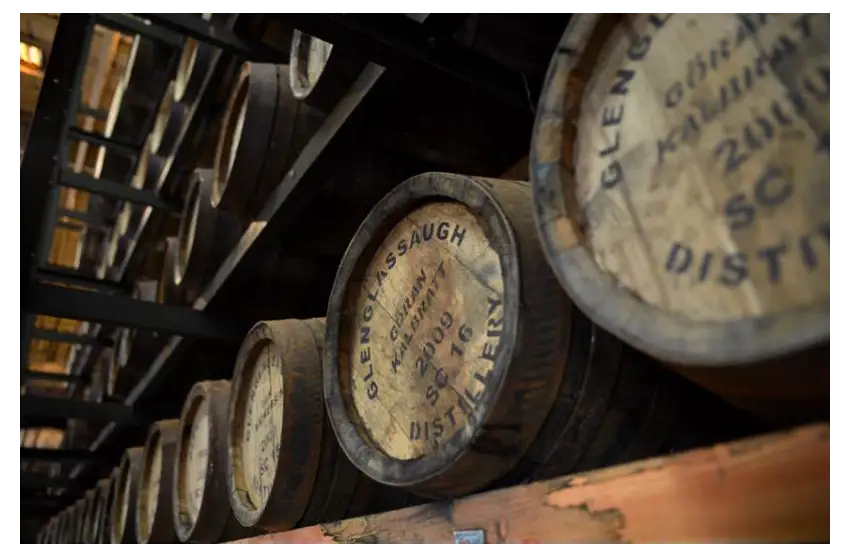
"Investing in whisky can yield attractive profits for the drink’s enthusiasts," says Chris Carter from MoneyWeek.
I recently visited Cask Trade’s founder, Simon Aron, on a sunny Friday morning at the firm’s offices on Regent Street to talk about whisky investment.
The offices are like a sweet shop for adults. Rows of toffee and caramel-coloured whisky samples line the shelves, a few tantalisingly labelled “Secret”. I ask Simon what that means. He says he’ll tell me later.
Whisky investing by the cask
Cask Trade (casktrade.com) is also something of a secret among whisky collectors and investors, albeit one that is becoming better known.
The company buys whole whisky casks from distilleries for resale. “Generally, people find competitors first,” says Simon. “Those are the people that are saying you will make 30% a year… and the distilleries will buy back the casks [at the end], which, of course, never happens. But it’s a nice story to tell because, obviously, this is amazing.
“You buy something and they buy it back and make a profit over the years… But it’s too good to be true.”
Cask Trade buys the casks, the rare gems that the distilleries are willing to give up, and there’s not a lot of them. “I get the crumbs off the big table and I’m grateful for it,” says Simon.
That means he can never be too sure of what he’s going to get. “I will order 50 casks and I will get 18. I order 18 and I get two. I get what I’m given… [because] the good stuff is easily sellable,” he says.
“Most of the distilleries like to keep it… Anyone selling casks by the pallet, in large quantities, in their thousands, is certainly not selling a rare quantity.” So, Simon gets the gold dust and it goes onto his list, which is sent to 10,000 people worldwide. “That’s my shop front.”
Is he personally a whisky enthusiast or a whisky investor? “Both,” he says. “They’re not mutually exclusive.” His background is in IT and he’s run a number of companies over the years. “But I’ve always had a passion for whisky,” he says. In his leisure time, he would travel “back and forth” to Scotland to indulge in his hobby. He amassed 4,000 bottles before the question of where to store them all arose and he “graduated naturally and logically from bottles to casks”.
But there was to be a learning curve. He had bought a cask, and 18 months later, he asked for a sample. There’s been a bit of a mistake, he was told. The cask he thought he had bought didn’t actually exist. Fraud? “I would say it certainly wasn’t innocent,” says Simon.
The sellers “did not make sure they had ownership of that cask, [although] they provided me with documentation and invoice and they took my payment”.
In the end, Simon had to get a lawyer involved. “I was very much caught up in the whole romance of buying casks, which, you know, as a Virgo I should have been much more kind of pedantic, because I had bought and sold IT companies… I’ve literally done my due diligence [on those firms]... and I just didn’t do it, because it was whisky and it’s fun and it’s what I like to drink and, oh, to have a cask of 1992 Springbank is a dream.”
Simon warns buyers to beware of whiskies being passed off as names they’re not.
Sometimes big-name distilleries will also sell their casks under an alternative name – hence the “secret” bottle I’d seen on the shelf. It’s the difference between a perfectly nice bracelet and a Cartier bracelet, says Simon. “Make sure you’ve got full naming rights on the cask. If you don’t, that’s okay. But pay the right price.”
Build a portfolio of whisky casks slowly
In 2018, Simon started the business he wishes he’d been introduced to when venturing into cask-buying.
Cask Trade asks customers three questions. What are they looking to achieve? How long do they intend to keep casks? And what are they looking to spend? “Don’t spend all your money at once,” says Simon. “Buy a couple of casks, see what we’ve got in a couple of months’ time… It’s no different to any person collecting a portfolio of whatever.”
The lowest-price cask he has on the list that day is a “new-make” for £2,000. There’s no minimum spend. With 70% of customers returning, “I know they’re going to come back… and maybe buy another one from a different distillery”. They will want to age their cask for at least ten years “to maximise their profit”, periodically regauging – which is like doing a health check to see how many litres remain after evaporation (the angels’ share) – and sampling to see how the whisky is coming on, services Cask Trade offers.
But don’t leave the whisky too long. “One of the biggest myths… is that you keep it until it is at its absolute oldest… It’s not true.” Simon tells me of one customer who went against the advice and was quite upset when they had to accept that their whisky had had it.
It also pays to have an exit strategy in mind from the outset. When the whisky is ready, you can bottle under your own label or Cask Trade’s Regent Street label, maybe for a special occasion.
“Whisky people share whisky,” as Simon says. Or you can choose to sell it via Cask Trade’s auction site, auctionyourcask. com, where there’s a 15% buyer’s fee.
Whatever you decide, have fun with it. “Our ethos is to make sure that people enjoy… and understand the experience,” says Simon. “We’re in our fifth year of business and we love what we do.”
Interested in whisky barrel investment? For more news from the Masters, sign up to our newsletter by ticking the box at the bottom of the registration form. Follow us on Instagram, TikTok, Facebook, Twitter, LinkedIn and YouTube.
